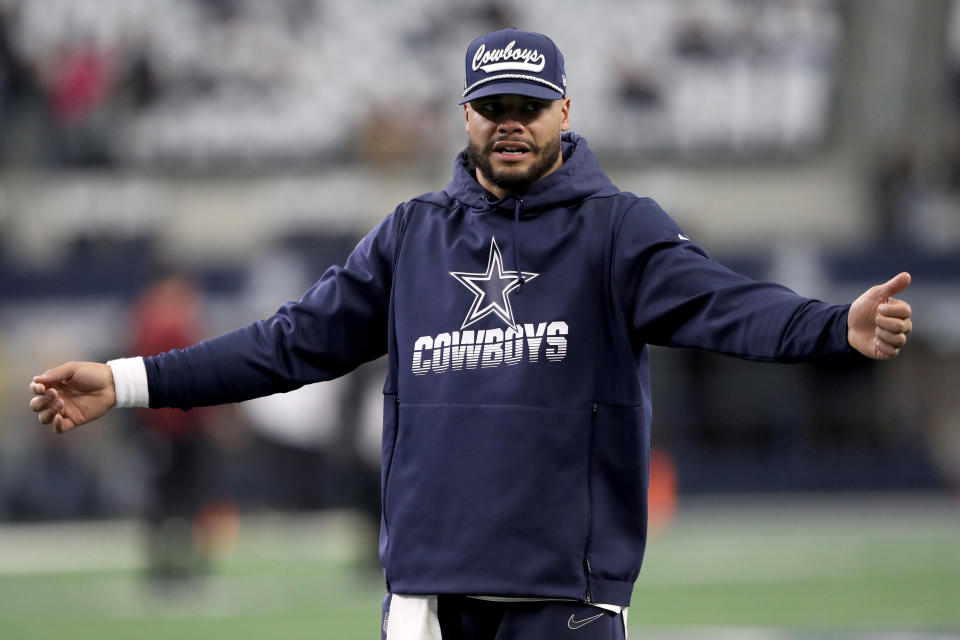Franchise tag looks inevitable for Cowboys and Dak Prescott, so what does that mean?
Even if the Dallas Cowboys and quarterback Dak Prescott come to a long-term agreement on a new contract, it appears there will be a roadblock along the way.
As in the franchise tag.
According to ESPN, the tag appears to be an inevitable step, even if both sides theoretically want to avoid that measure. The report states that “Dallas strongly prefers a long-term agreement” and will continue to work toward that end. The same is true for Prescott, who becomes an unrestricted free agent in early March.
So why the extra step? Right now, it appears the two sides are far enough apart in negotiations to where the tag might be needed to buy time.
Prescott, who turns 27 in July, finished the 2019 season with career highs in completions (388), pass attempts (596), passing yards (4,902, second-most in the NFL this season) and TD passes (30, fourth-most in the league). He’s made two Pro Bowls in his four seasons as the Cowboys’ starting quarterback.
The Cowboys have benefitted from the former fourth-rounder’s bargain contract that paid him a little more than $2.7 million over the past four years.
There are two forms of the franchise tag: exclusive and non-exclusive. If the Cowboys execute the exclusive franchise tag, they would be guaranteeing Prescott a one-year contract for the average of the top five salaries at quarterback. Additionally, the exclusive tag prevents Prescott from negotiating with other teams.
The non-exclusive tag would guarantee the same minimum salary, but Prescott could negotiate with any other NFL team. The Cowboys would have the right in either case to match any potential offer sheet Prescott receives. If the Cowboys allowed Prescott to walk, they would receive two first-round draft picks as compensation.

What kind of money might Dak be seeking?
In December, Yahoo Sports’ Charles Robinson reported that Prescott’s camp and the Cowboys had gone months without any substantive contract talks and that Prescott’s camp turned down a preseason offer that would have compared favorably to the deal received by the Philadelphia Eagles’ Carson Wentz, who signed a four-year extension for $128 million last June. Another recent comp, contract-wise, was the Los Angeles Rams giving Jared Goff an extension for four years and $134 million back in September.
Could Prescott be seeking a contract in the $35 million-per-year range? That’s currently the league’s high-water mark, thanks to Russell Wilson’s four-year, $140 million deal.
The other NFL quarterbacks north of the $30M average include the Pittsburgh Steelers’ Ben Roethlisberger ($34 million), the Green Bay Packers’ Aaron Rodgers ($33.5 million), Goff ($33.5 million) and Wentz ($32 million).
We’re embarking on an unusual offseason, with a number of big-name quarterbacks potentially hitting free agency. The new deals for Drew Brees (if he doesn’t retire), Tom Brady, Philip Rivers and even Jameis Winston potentially could alter the marketplace.
The Kansas City Chiefs also reportedly plan to offer Patrick Mahomes a lucrative contract extension this offseason. The reported APY figures for a new Mahomes deal have been rumored to be in the $40-million-per-year range.
There’s also this from Robinson’s December report to mull over:
“Prescott’s camp would like a shorter deal — similar to the four-year extensions of Wentz and Goff — that would allow Prescott to continue rotating into free agency and keeping his salary commensurate with where the NFL is heading with elite-level quarterback pay.”
Could Prescott fail to report if he’s tagged?
The worry for the Cowboys is that tagging Prescott — while well-intentioned as a way of buying the team more time — potentially could alienate the star QB.
Prescott has played his cards close to the vest and chosen his words carefully to this point, and there are roughly 40 days until March 10, when the decision to tag him or not must be executed. There’s no panic on either side yet.
But Prescott could wield some leverage by refusing to report to offseason activities without a new deal in hand. He could carry that threat out until training camp if the impasse lasts that long, holding the Cowboys hostage a bit as they enter this offseason of change.
Jason Garrett has been let go, replaced by new head coach Mike McCarthy, who brings a new offensive system. Not having Prescott present for those key installation sessions could be viewed as a big impediment for the new coach who would want to hit the ground running this offseason and likely avoid the barrage of offseason questions about Prescott’s absence.
The Cowboys could try to count on Prescott, the team’s leader, putting hard feelings aside and reporting to offseason activities. But that could be a dangerous gamble, and it feels like the two sides are enduring a bit of quiet tension behind the scenes as things stand now, even if neither side has expressed any public discontent.
This situation is far different than the impasse running back Ezekiel Elliott had with the Cowboys before his massive extension last summer. Elliott was under contract, and he took part in last year’s offseason program out of good faith. He then held out of training camp while seeking a new deal, holding the leverage of potentially missing regular season games.
But Elliott was not a quarterback, and a different coaching staff was in place. The circumstances couldn’t have been more different on a number of levels. That’s why we really can’t use what happened with Elliott as a potential road map to a new deal.
It’s business, and it could get ugly. But we are starting to see how the first few phases of this process could play out.
More from Yahoo Sports
